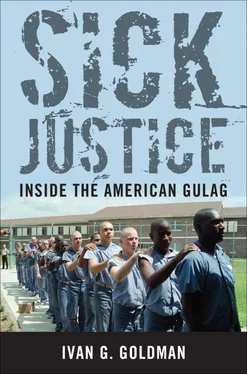PREEXISTING CONDITION
Consider the case of John Ray Wilson. 50An uninsured multiple sclerosis (MS) patient, he was sentenced in 2010, at age thirty-eight, to five years in prison by a New Jersey judge for manufacturing and possessing seventeen marijuana plants he’d been growing to treat symptoms of his disease. He wasn’t accused of transportation or sales and was both the victim and the perpetrator of his crime. “He was in a situation where he had no health insurance and no other way to obtain medical coverage,” said his attorney, James Wronko. Jurors weren’t allowed to hear the mandatory penalties included in the statutes so that their verdict wouldn’t be affected by them. Among the counts against Wilson, one—operating a drug-production facility—was punishable by up to twenty years in prison. The jury acquitted him of that charge.
Ultimately, after much wrangling, Wilson was allowed to make a brief, one-sentence declaration that he had medical reasons for growing the marijuana, but Superior Court Judge Robert Reed wouldn’t allow him to explain to the jury that he grew the plants only for personal use. Neither would Reed let Wilson’s lawyer call an expert witness to testify about the medicinal effects of marijuana. An appellate court later ruled that the judge had acted correctly and upheld both the trial and sentence, rejecting an argument that five years was too harsh a punishment.
Ironically, Wilson, who’d been suffering from MS for nine years, was convicted one week after Governor Chris Christie approved the establishment of medical marijuana dispensaries in New Jersey. Had they existed earlier, Wilson might have avoided prosecution altogether. He began serving his term in August 2011 and presumably will now be prevented from committing crimes against himself.
At the start of 2013 eighteen states had decriminalized personal possession of marijuana for proved medicinal use. Colorado and Washington had legalized it for recreational use. The herb remains illegal under federal statutes. 51We reside in a confusing, betwixt-and-between stage of twilight legality. Local authorities in some precincts, hampered by liberalized state law, call in federal authorities to make arrests. The result of all these conflicting statutes is a hodgepodge justice that sends one hapless soul to a lengthy prison sentence while someone else who committed the same act walks off barely inconvenienced.
LIFE WITHOUT PAROLE
Marcia G. Shein is a defense lawyer in Decatur, Georgia, who specializes in federal criminal law and takes cases all over the country. She still loses sleep over the case of a deputy sheriff in Marengo County, Alabama, who at age twenty-five was sentenced to life without parole after being convicted of conspiracy in the sale of crack cocaine and marijuana. “I almost left the practice of law over this case,” she told me. “It’s just so incredible that they would put someone in jail for the rest of his life on this charge. I have murder cases in which defendants are eligible for release, and this kid gets life without parole. There were no firearms involved; he had no criminal record; there wasn’t any violence. It’s a tragedy that we’ve allowed our system to go so far to the right.” 52
The deputy, Wilmer Breckenridge, was convicted based on the testimony of one informant, another deputy who was sentenced to 150 months. There was no corroborating evidence or witnesses, no physical evidence, nothing to tie Breckenridge to the charges except the word of Deputy Robert Pickens, a conniver who sold drugs, took payoffs from dealers, and once even torched his own car to collect insurance money. Pickens testified that Breckenridge had agreed to warn dealers of any impending busts. There were no audiotapes, and not one drug dealer claimed Breckenridge worked with them or took their money. In fact, dealers who’d conspired with Pickens were willing to take the stand and say that they had no such dealings with Breckenridge, but neither side asked for their testimony.
Shein, who didn’t come into the case until the appeals stage, said all possible remedies have been exhausted—a motion for a new trial, a commutation of sentence, all of it. She added,
I did everything I could do for this kid, but I just couldn’t break through. The case is so draconian. He’s going to have a pine box exit. Unless his health goes bad and he’s over sixty-five. Then they might throw him out. He was given, in essence, a prison term death sentence.
All your life something can eat at you. This is the one, the one that breaks my heart. Even the original lawyers admitted they didn’t do a good job.
For example, they failed to hire a private investigator who might have proved that Pickens’s statements were false. “But the judge just ignored all that,” Shein said, “and let him rot in prison…. He’d never been in trouble, he’s lost his kids, his wife, and he’s been transferred eleven different times.” Like so many other inmates who once worked in law enforcement, Breckenridge refuses to request protective custody, which is essentially solitary confinement. Prison authorities try to protect his identity, but eventually word leaks out among inmates. According to Shein, “Then they throw him in the hole and transfer him someplace else.”
Shein told me that authorities who extract extreme penalties in this and similar cases appear to have lost their reason. “I don’t understand how some of these people live with themselves,” she said. “I pray every day that one of them would have a child of their own get in trouble before they become prosecutors or judges. Just for a week. That’s all it would take.”
5
The Death of Rachel Hoffman
NOTHING MORE STARKLY DEMONSTRATES THE DESTRUCTIVENESS OF OUR DRUG laws than the vicious, grievous murder of Rachel Morningstar Hoffman. 1A psychology major who’d just graduated from Florida State University, Hoffman, age twenty-three, was on track to attend culinary school in Arizona. Friends described her as a free spirit, friendly and open, a post–hippie era hippie. Her family said that Hoffman lived her life according to the Beatles song “All You Need Is Love.” She was utterly unprepared for the nightmare world that was thrust upon her.
During a traffic stop and search in February 2007, Hoffman was caught in Tallahassee with less than an ounce of marijuana. In Florida possession of that much pot was a felony punishable by up to five years in prison. In some states her offense would have been treated like a parking ticket. In Tallahassee, however, the law looked upon her as a serious malefactor, and she ended up in drug court. She was told that by allowing this special court to monitor her, she could avoid jail time. In fact, charges would be dropped altogether if she stayed clean for a year. Advocates generally describe drug courts as a tool of reform, a way to steer users away from lives of crime or iniquity by giving them special attention. They may even have started out that way. But because of the way they’re administered, drug courts often create a precisely opposite result. Louisville, Kentucky, defense attorney Nathan Miller points to Hoffman’s fate as the perfect, tragic example of a heavy-handed “reform” that’s another sad component of an out-of-control system.
Hoffman had to surrender many of her constitutional rights to enter the program. And although logic would dictate that authorities could better use their time, fourteen months after her arrest, Tallahassee police conducted a surprise search of her apartment. They needed no warrant because she hadn’t been in the drug court diversion program for more than a year. This time they found about five ounces of marijuana and four ecstasy pills. They told her a prison sentence was certain unless she led them to other marijuana and ecstasy users. She refused to betray her friends. But trying to make the best of a bad situation, she eventually agreed to act as a confidential informant and help cops corral people committing what they told her would be serious offenses. She would have to stay in Tallahassee and defer cooking school.
Читать дальше












